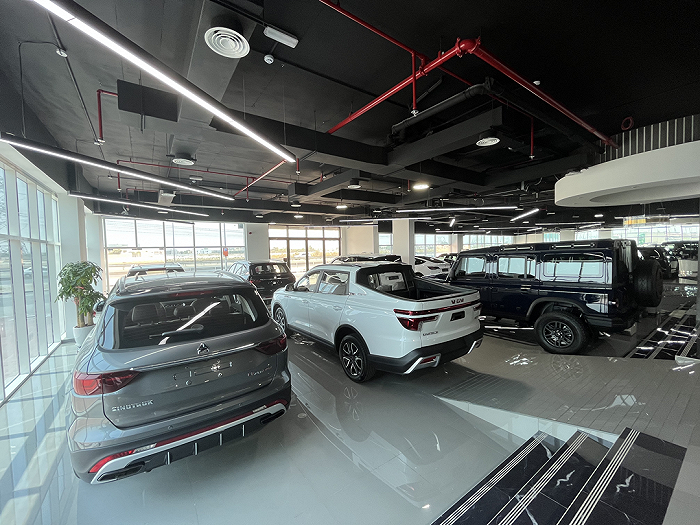บริษัทรถยนต์พลังงานใหม่ของจีนเป็นหัวหอกในการขยายตลาดตะวันออกกลาง
It might sound improbable, but an extraordinary transformation is unfolding right now in one of the world’s least oil-dependent regions.
Across bustling metropolises like Dubai and Abu Dhabi, in the heart of the Middle East, an unexpected phenomenon has emerged. The most sought-after parking spots at every shopping center are no longer reserved for luxurious gasoline-powered vehicles; they are now dedicated to electric cars.

(ภาพ: Dubai Motor Trading Company)
“วันนี้, charging stations thrive at every consumer hub, office complex, and residential enclave across the UAE, with electric vehicles seamlessly navigating the cityscape. But just a couple of years ago, the notion of charging stations within malls was a distant dream, and few were seen,” shared Juno, the regional sales director of a prominent car trading firm, based in Dubai.
This rapid embrace of electric mobility exemplifies the Middle East’s remarkable transition. Despite its relatively recent entry into the รถยนต์พลังงานใหม่ arena, the region’s progress has been nothing short of astounding.
A regular commuter in Dubai can now witness a captivating sight on their daily route: a sleek vehicle accelerating with unmatched swiftness. Traditionally, this spectacle was reserved for high-performance gas-guzzlers like Lamborghinis; อย่างไรก็ตาม, nowadays, the odds are high that the speeding car is a Chinese electric vehicle.
The secret to this electrifying acceleration lies in the ingenious design of these cars, which can reach 100 kilometers per hour in a mere 3 วินาที. ในทางตรงกันข้าม, the most celebrated fuel-powered brands like Lexus, เมอร์เซเดส-เบนซ์, and BMW, after years of development, require over 6 seconds for the same feat.
This transformation hasn’t gone unnoticed by industry insiders like Juno, who recognize that the Middle East is fast becoming a pivotal overseas market for China’s burgeoning electric vehicle sector.
Statistics from the China Association of Automobile Manufacturers underscore this burgeoning trend. Cumulative vehicle exports data from January to November 2022 spotlight the Middle East as a thriving destination, with countries like Saudi Arabia, the United Arab Emirates, and other nations making a notable contribution. Export figures grew an impressive 2.7 times compared to the previous year.
ใน 2023, China’s new energy vehicles continue to dazzle on the global stage. Recent reports from the China Association of Automobile Manufacturers reveal that the first half of the year witnessed a staggering 76.9% year-on-year increase in complete automobile exports, accounting for a remarkable 2.341 ล้านหน่วย. This marked growth led to an export value of $46.42 พันล้าน, a figure that surged by 1.1 times. In an unprecedented turn, China’s automotive exports have overtaken Japan’s for two consecutive quarters, cementing its position as the world leader.
As China’s automotive prowess reverberates globally, emerging markets have begun to take note of the nation’s advancements in new energy vehicles.
As evidence of this new reality, สนช. secured a monumental $1.1 billion strategic investment from CYVN Holdings, an Abu Dhabi-based investment institution, in late June. This move, coupled with the recent cooperation agreements of other prominent Chinese electric vehicle manufacturers, sparked vibrant discussions within the industry. อนึ่ง, just a few weeks later in July, companies like Jikrypton and Xiaopeng unveiled ambitious plans in Israel.
With unwavering momentum, Chinese electric vehicles are accelerating their presence into the heart of the Middle East, embodying a seismic shift in the region’s automotive landscape.

 รถยนต์ในประเทศจีน
รถยนต์ในประเทศจีน